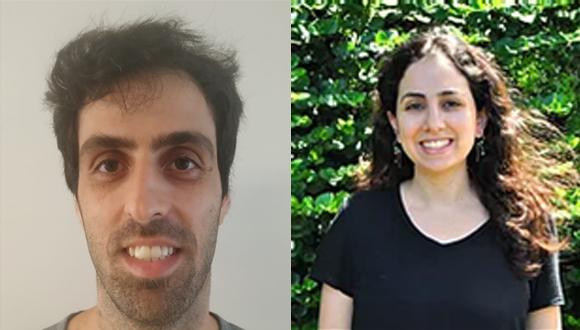Congratulations to PhD students Noa Gilat and Tzach Mukra from the School of Chemistry for winning the Eran and Avital Rabani Award for groundbreaking work in Chemistry
Noa Gilat (Prof. Yuval Ebenstein’s group, the Department of Physical Chemistry) and Tzach Mukra (Prof. Emanuel Peled’s Group, the Department of Physical Chemistry)
Because of their higher energy density, compared to lithium-ion batteries, rechargeable lithium-metal batteries have been considered one of the most attractive next-generation energy-storage systems. Deposition and dissolution of lithium occur at the anode of this type of battery. While lithium is being deposited/dissolved, several undesired processes take place that deteriorates the battery performance. Such processes include the formation of inactive (dead) lithium, lithium dendrites formation, undesired reduction of the electrolyte, and the repair of the SEI (solid electrolyte interphase, which protects the anode from destructive reactions with the electrolyte). In my research, I studied the effects of several parameters on the deposition – dissolution processes: type of electrolyte, current density, and cycle number on the SEI properties, total capacity loss, the capacity needed to repair the SEI, two types of dead lithium formation, reduction of the electrolyte, coulombic efficiency and on the correlation among them. In my work, for the first time, I developed and published protocols for determination the capacity loss associate with dead lithium-temporary connected and the capacity loss during the repair of the SEI each cycle.
Determination and understanding of these processes will enable mitigating these losses and increasing the cycle life of the lithium metal batteries.
Rapid Repair Assisted Damage Detection (Rapid-RADD) was designed to serve as a DNA damage quantification method for multiple DNA samples at once. In this method, Fluorescently labeled DNA samples are placed over a partitioned glass slide, allowing the quantification of up to 90 DNA samples at once. Using Rapid-RADD, accurate and sensitive measurements of oxidative and UV-induced DNA damage levels and repair kinetics were measured for both in-vitro and in-vivo models.





